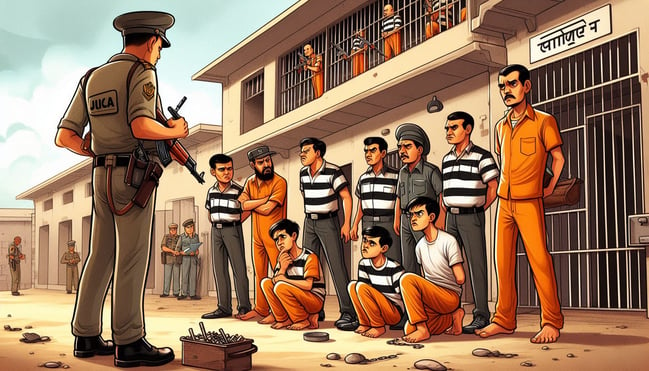Hussainara Khatoon v. State of Bihar (1979)
Deepika Chaneja
H.P.College Of Law, H.P.U
This Case Commentary is written by Deepika Chaneja, a Fifth-Year Law Student of H.P.College Of Law, H.P.U


CASE DETAILS
Case name: Hussainara Khatoon vs State of Bihar (1979)
Citation : 1979 AIR 1369, 1979 SCR (3) 532
Court: Supreme Court of India
Bench: Justice P.N Bhagwati, Justice R.S Pathak, and Justice A.D kosher
Date of judgment: 9th March, 1979
Parties: Hussainara Khatoon and others (petitioner), state of Bihar (respondent)
INTRODUCTION
The Constitution of India, 1950 guarantees certain fundamental rights. It talks about equality and equal protection under the law. Hussainara Khatoon Versus the state of Bihar is a landmark case in which the court held that every prisoner has a fundamental right, the right to free legal aid the right to speedy trials, etc. This case outlines The human Lee rights of prisoners and marks the origin of public interest litigation in India. The constitution favours no one, every citizen is equal before the law. Later under this case, speedy trial was held as the fundamental right of prisoners under Article 21 of the constitution of India, 1950.
FACTS OF THE CASE
Advocate Pushpa Kapila Hingorani, popularly known as the mother of public interest litigation, filed a habeas corpus writ before the court, calling out the injustice against prisoners in Patna and Muzaffarpur jails. The issues of prolonged detention without bail, even after the expiration of their detention period, and the denial of the right of speedy trial to prisoners were highlighted by her in the writ. This writ was filed under Article 32 of the Indian constitution. There were several women, children, and others being locked behind bars and seeking trials and release. R.F. Rustum made a report on his visit to Muzaffarpur and Patna jails During his tenure in the national police Commission in Bihar, in 1977 which was published as an article in the Indian Express newspaper. He noticed that many prisoners were in jail without any proper trials. The majority of these outlived the time of punishment which would have been awarded by the court if found guilty. This article is called the sight of advocate Pushpa and she presented a writ before the Supreme Court of India on behalf of Hussainara Khatoon and other prisoners. Despite a direct government order to release prisoners held under the Foreigners Act 1946 Hussainara Khatoon had been in jail for four to five years.
ISSUES RAISED
· Whether the right to a speedy trial is encompassed under Article 21?
· Whether free legal aid should be interpreted as part of the directive principle of state policy?
LAW AND PROVISIONS INVOLVED
· Article 21 - under trials, right to life - right to a speedy trial, the constitution of India.
This article ensures the protection of the right to life and personal liberty, exceptions included. Personal liberty gives freedom to move, reside, etc. Every person is guaranteed the right to life from a normal person to prisoners who are detained. If one is illegally detained then they can exercise their fundamental rights.
· Article 39A – right to free legal aid
Article 39A under the constitution of India guarantees equal justice and has provisions for free legal aid. It ensures justice by the government through legislation or directions of relevant authorities.
ARGUMENTS OF THE PARTIES
· Petitioner
The petitioner debated the prisoners were being kept in remand on injustice and unreasonable grounds in Patna and Muzaffarpur jails. They were presented before a magistrate at the hearing, but the court passed an order to keep them in judicial custody at the request of the police instead of hearing those parties. They were confined illegally even when their detention was over. And stated how their right to a speedy trial and right to life was violated as per Article 21, of the constitution of India
· Respondent
The state of Bihar did not consider the order of the Supreme Court and no one showed up on behalf of the state of Bihar.
JUDGMENT
A division bench of Justice P.N Bhagwati and Justice Desai Decided the judgment. As the state of Bihar failed to present or make an appearance despite the notice by the Supreme Court the court considered the allegations in the report and writ as as correct. This was an interim order passed by the Supreme Court. Men, women, and children mentioned in the list by advocate Pushpa were granted immediate bail by the court. They were guaranteed bail along with personal sureties as it violated their right to life as guaranteed under Article 21 of the constitution of India. Further court ordered the state government and high courts to make a list of all pending cases and submit them by December 1978, and their reasons as such.
CONCLUSION
This case showcased the irresponsible behaviour of our justice system and how fundamental rights are being violated of those indeed. The judgment of this case made a huge impact on the right to speedy trials, the right to free legal aid, the right to life, etc. The judgment of this case was of high importance. No matter who the justice must be served in the right hands. Power or money should not be the easy manipulators in the legal justice system. Still, because of the lack of speedy trials and judges, there are a lot of pending cases and jails filled with prisoners under trial. Parliament was advised by the court to make amendments to the bail procedure.
